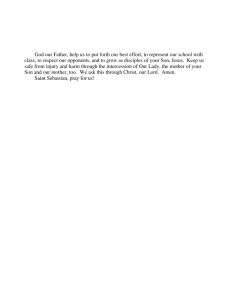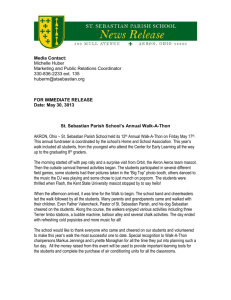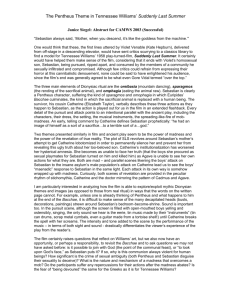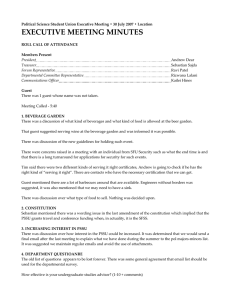CANADA ) HER MAJESTY THE QUEEN
advertisement
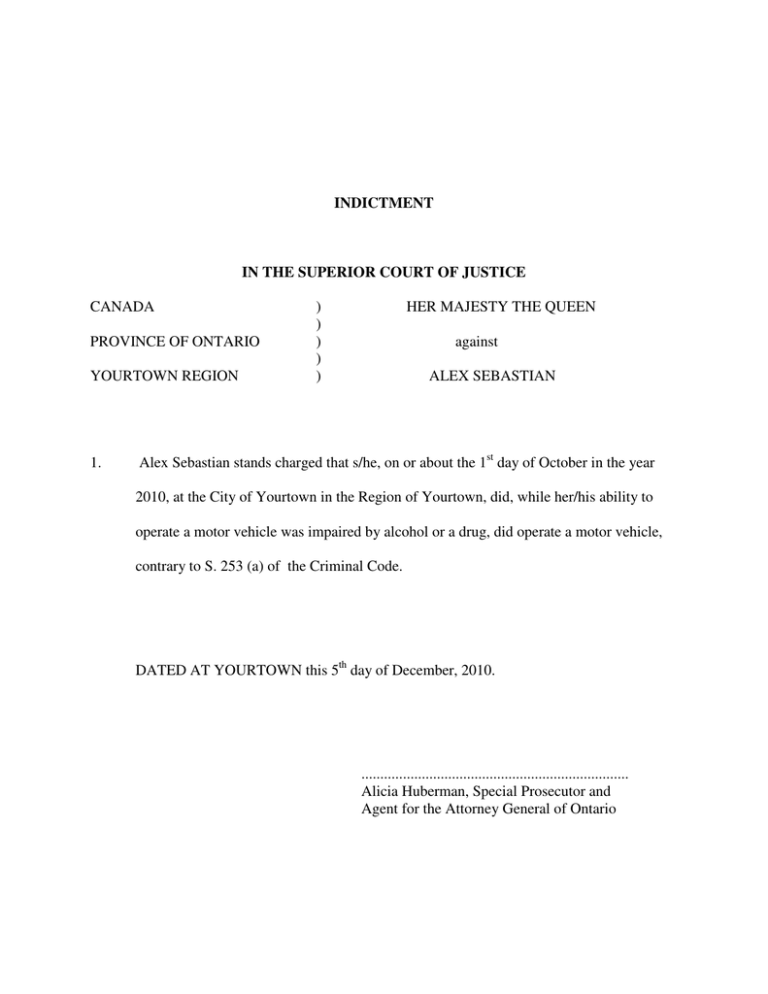
INDICTMENT IN THE SUPERIOR COURT OF JUSTICE CANADA PROVINCE OF ONTARIO YOURTOWN REGION 1. ) ) ) ) ) HER MAJESTY THE QUEEN against ALEX SEBASTIAN Alex Sebastian stands charged that s/he, on or about the 1st day of October in the year 2010, at the City of Yourtown in the Region of Yourtown, did, while her/his ability to operate a motor vehicle was impaired by alcohol or a drug, did operate a motor vehicle, contrary to S. 253 (a) of the Criminal Code. DATED AT YOURTOWN this 5th day of December, 2010. ....................................................................... Alicia Huberman, Special Prosecutor and Agent for the Attorney General of Ontario R. v. ALEX SEBASTIAN Anticipated evidence of the Witness My name is Hildy Johnson. I am an investigative reporter for the Yourtown Daily Standard. I have been doing this sort of work for the past three years, but have been a reporter for twenty. Recently, the paper has assigned me to investigate possible corruption in the Yourtown Police Service. This could cover any form of illicit activity, from bribery to perjury to mistreating suspects. The latter has been a major concern. I recall when I started working for the paper, many lawyers in Yourtown signed a petition asking that the Hold Up Squad be investigated for torturing suspects. Nothing was done by the police, but my paper uncovered some evidence that could have led to charges. I understand that several of the officers involved have been steadily promoted. On October 1, 2010, I had just met with a confidential source on the corruption file. I then went to the Hitchcock Reference Library and was on the top floor. This is a large area with a panoramic view of the city. I was looking out the rear window, just taking a break from my research when I saw a car weaving between lanes. What drew my attention to the car was that is was large and bright red. So, I watched for a couple of minutes. The driver must have been bombed or stoned or something. The car almost sideswiped several other cars then crossed a median and hit a pole, just about one block from the main library entrance. I saw all this, I observed it pretty carefully. When I saw it hit, I called 911 on my cell and ran down to see what was going on. Someone could have been hurt. I also called my editor, Walter Burns, in case this could be local news. I got to the scene in about five minutes. I did not see anyone at the wheel, but saw a senior police officer I knew, Alex Sebastian, near the car. S/he had been one of the people implicated in the Hold Up Squad investigation years before. I asked him/her if she was driving but s/he just looked at me. S/he looked a bit stunned and I could smell a bit of booze on his/her breath. I told him/her that I saw the crash and I knew s/he was driving. I was not going to let this go, it was a story and I was on to it. I said again, you were driving and you are drunk. S/he looked at me and told me to “F off, I don’t talk to the press”. I could smell the booze on his/her breath. I took down the licence plate number in case s/he tried to deny any connection to the car later. It was RKO 279. I later checked with the Ministry of Transport and got a print out confirming Sebastian owned the vehicle. I was still there when a younger cop showed up. I figured it was cover up time. The young cop went to Sebastian and said something. I could not hear but I went to the cop and asked was Sebastian being charged. I was told to stay back and not interfere. Several other cop cars showed up then and everyone was pushed back from the scene. Fortunately, Mr. Burns sent a photographer, Johnnie Aysgarth, our best man, along so we were able to get some pictures of what happened before the cops could cover up. I will definitely come to court to state what I saw. Helpful Suggestions In order to carry out your role successfully, you will have to meet with the Crown before trial to work out other details about your character. You should not discuss what the evidence of other witnesses will be. This will taint your evidence and lessen its effectiveness. Opposing counsel will be able to inquire if you did discuss your evidence with anyone. Remember, a witness should only be testifying as to his/her personal knowledge and observations. It is important that you be prepared for your testimony. Not being prepared may make the judge think that you are making up your evidence as you go along. Similarly, major inconsistencies in evidence will tell against your credibility. On the other hand, minor inconsistencies may be hallmarks of truth, since people will often see things differently, even when describing the same event. Your credibility and reliability are central to this case. A witness may be in a position to observe carefully, but this is not always the case, Many factors, such as stress, will cause a person to misconstrue something. Or, even the most honest witness can make a mistake. Other witnesses will be biased. This is all relevant to witness credibility. R. v. ALEX SEBASTIAN Anticipated evidence of the Witness My name is T. R. Devlin. I am a member of the Yourtown Police Service and have been so employed for nine years. I hold the rank of Constable, First Class. During that time, I have been on general duties, a crime prevention officer, school liaison officer and two years ago, I was qualified by the Solicitor General as a qualified technician to operate an Intoxilyzer 5000C breath instrument. I completed, in September of 2010, an evaluating officer’s course to detect impaired driving through drug use. My final exams were set for November of 2010 and I was successful. On October 1, 2010, I had completed the training for, but not the examination portion of, the evaluating officer’s course, so I was not qualified to conduct evaluations. On that date, I was on general patrol when I received a radio call to attend at a motor vehicle accident by the Hitchcock Reference Library. There may have been personal injuries and the driver may have been impaired. I proceeded directly south on Archie Leach Boulevard and stopped outside the library. A crowd was forming around the scene. A large, red, late model motor vehicle, licence plate RKO 279 had hit a hydro pole. There was extensive damage to both pole and car. I radioed my dispatcher to get a Yourtown Hydro crew out to the scene in case any wires came down. I then approached the vehicle. A person who identified themselves as a reporter came up to me and pointed out a person who s/he said was driving. I recognized the alleged driver as Staff Sergeant Alex Sebastian, who is a senior member of the Yourtown Police Emergency Task Force. S/he is not my commanding officer. I went to Sebastian and asked if s/he was driving. S/he looked at me like s/he was stunned. I was not sure if this was due to being shaken up in the crash. I then asked ‘Staff, were you driving?” I was close enough to smell alcohol on his/her breath. I then decided that this could be an impaired investigation and told Sebastian that I wanted his/her licence, ownership and insurance. I was shown his/her badge and warrant card. I told him/her again, licence, ownership and insurance. These were produced with a bit of difficulty from a jacket pocket. In light of the crowd forming and in order to conduct a proper investigation, I told Sebastian to get into the scout car back seat. The reporter and a photographer were coming over so I told them not to interfere, get back. One of them yelled “no cover up, cop!” I ignored this. I knew that I had to dot every “I” and cross every “T” if I was investigating a senior officer. When Sebastian got in the scout car, I asked if s/he was okay and again s/he looked like she was under the influence. S/he was slow to respond. I then arrested him/her for impaired driving, read him/her the Charter rights and made a formal breath demand. I did not have an approved screening device with me, so I decided to drive directly to the main police division, about five minutes away. I did not handcuff the now accused as I saw no danger in this case. Before leaving, I asked other units on scene to tell everyone to get back due to the possibility of hydro wires coming down. At the police station, I immediately set up the Intoxilyxer 5000C for a breath test. Sebastian did not want to call counsel and was co-operative. S/he blew two good samples, registering .06 and .049 on the instrument. I was surprised by the result. I would have expected a much higher reading. However, this confirmed my view that Sebastian was impaired by some form of drug. A search revealed no illicit drug. I did not process a certificate as the readings were well below the legal limit. I did not issue a 72 provincial hour licence suspension as one reading was below .05 and I was not sure that a suspension should be issued. I turned Sebastian over to the officer in charge of the station, Inspector John Robie, for processing and release. Helpful Suggestions In order to carry out your role successfully, you will have to meet with the Crown before trial to work out other details about your character. You should not discuss what the evidence of other witnesses will be. This will taint your evidence and lessen its effectiveness. Opposing counsel will be able to inquire if you did discuss your evidence with anyone. Remember, a witness should only be testifying as to his/her personal knowledge and observations. It is important that you be prepared for your testimony. Not being prepared may make the judge think that you are making up your evidence as you go along. Similarly, major inconsistencies in evidence will tell against your credibility. On the other hand, minor inconsistencies may be hallmarks of truth, since people will often see things differently, even when describing the same event. Your credibility is central to this case. R. v. ALEX SEBASTIAN Anticipated evidence of the Witness My name is Alex Sebastian and I have been a police officer for thirty years. I hold the rank of Staff Sergeant and am a senior officer on the Yourtown Police Service Emergency Task Force. I was on annual leave on October 1, 2010 and was not scheduled to come back to work until October 18th, when my vacation was over. I had to go to the dentist for a chipped tooth that day. My regular dentists, Dr. Anderson and Dr. Barbosa, were at a conference on that day, so Dr. Chris Szell was handling their appointments. I arrived that morning. The tooth was pretty painful so Dr. Szell explained that s/he would have to give me some anaesthetic to freeze the tooth before working on it. I have no allergies and agreed. When the dentist started drilling there was a lot of pain, so s/he gave me a further injection. I finished the appointment around 11:00. I felt sort of woozy so the dentist told me to lie down in a rest area. I must have slept for about an hour. When I woke up, I felt fine. I was told to be careful if I was going to do any activities that required any real level of co-ordination. They offered to call a cab for me, but I felt fine, so I left the office and decided to give my friend, C. K. Dexter Haven, a call to see if he was free for lunch. We met and had a sandwich. I decided to have a pint of beer, Dex does not drink. I was careful to only have one pint as that would not put me over the legal limit for driving or the provincial .05 suspension limit. If I was charged with an offence or had violated provincial regulations on drinking and driving, I could have faced disciplinary proceedings ordered by the Chief of Police. I drove down the street toward downtown and was feeling a bit woozy again. I thought it was not bad, and I would be at my first errand in a few minutes anyways, so I thought I would be okay. The next thing I knew, I was waking up and getting out of my car. I remember, slightly, a reporter named Hildy Johnson coming over to me and yelling at me. I don’t think I replied. Then a young officer came over to me and was asking questions and asked me to sit in the back of his/her scout car. I was not feeling well at that time. Then the officer arrested me. I was shocked by that. I demanded to know why and was told that we would deal with everything in the presence of senior officers at the division. I guess I now understand how some suspects feel. I was not handcuffed by the officer and we arrived at the station quickly. When at the division, I did not call my counsel, Adam Bonner, as I was confident that I would easily pass any breath test. The results surprised me. The officer did not suspend my licence, but did turn me over to Inspector Robie, who stated that the matter would have to be referred to Internal Affairs and that I would be contacted by Deputy Chief Jack Clayton. I do not believe that I was impaired at all that day. If I was, I certainly did not knowingly take anything that would result in that condition. My career is very important to me and I would not throw it away. I would not engage in any form of illegal conduct. Helpful Suggestions In order to carry out your role successfully, you will have to meet with the defence before trial to work out other details about your character. You should not discuss what the evidence of other witnesses will be. This will taint your evidence and lessen its effectiveness. Opposing counsel will be able to inquire if you did discuss your evidence with anyone. Remember, a witness should only be testifying as to his/her personal knowledge and observations. It is important that you be prepared for your testimony. Not being prepared may make the judge think that you are making up your evidence as you go along. Similarly, major inconsistencies in evidence will tell against your credibility. On the other hand, minor inconsistencies may be hallmarks of truth, since people will often see things differently, even when describing the same event. Your credibility is central to this case. R. v. ALEX SEBASTIAN Anticipated evidence of the Witness My name is Dr. Chris Szell. I am a member of the Royal College of Dental Surgeons of Ontario. I have been a dentist since 1975, having studied at the University of Toronto. I have also taught dentistry at that University for fifteen years (1985 - 2000) and completed postdoctoral studies on dental diseases. I am the author of twenty-seven articles on various aspects of dentistry and a contributing editor of three undergraduate texts dealing with dental medications. I have been the Marion Morrison special instructor in the examinations department of the College for the past five years. On October 1, 2010, I was providing a locum for my colleagues, Drs. Anderson and Barbosa. They were at a national conference in Ottawa. They had a series of routine appointments. I have not done a locum in some years as this is more often done by junior practitioners and most of my work has been professional instruction in recent years, but these doctors and I have had a long history of service together and are good friends and colleagues. For that reason, I was pleased to cover their practice on that occasion. I met Alex Sebastian that day. This person complained of a chipped tooth. This would require, in layman’s terms, cleaning the tooth, removing debris, ensuring that there was no infection and capping the tooth. This patient was given a standard dose of procaine, an anaesthetic. This would “freeze” the area being worked on. However, this patient appeared to be in pain, so an additional half-dose was administered. The procedure was successful. At the end of the procedure, the patient appeared light-headed or poorly co-ordinated. I had the patient rest in a private area for approximately one hour and when the patient awoke inquired as to his/her symptoms. The patient appeared oriented, but was informed that s/he should not do any tasks involving special co-ordination or which may be dangerous. Going shopping, for example, was fine but operating a table saw would be forbidden. I had no reason to believe the patient would drink so did not advise the patient of any possible effects of drinking in addition to the effects of the anaesthetic. I would think it basic sense to not consume alcohol after any medical procedure involving administering an anaesthetic. However, even if the patient had consumed several drinks with their dinner that night, for example, it is not likely that it would have had any serious effect on them, considering the time that passed. Of course, there are variables. The greater alcohol consumption, the greater the risk of a reaction. The closer the consumption to the time of the procedure, the greater the risk. Then there is always the one person who proves to the exception to the rule. This makes for interesting medical studies, but the vast majority of times even consuming alcohol after the anaesthetic would not produce a malfunctioning person. I would not think it likely that a person in this situation would become seriously impaired. In order to give a more exacting opinion, I would have to conduct an actual controlled study of the person, which I have not done. I will require several months notice if I am required to come to court due to my professional and teaching obligations. Helpful Suggestions In order to carry out your role successfully, you will have to meet with the defence before trial to work out other details about your character. You should not discuss what the evidence of other witnesses will be. This will taint your evidence and lessen its effectiveness. Opposing counsel will be able to inquire if you did discuss your evidence with anyone. Remember, a witness should only be testifying as to his/her personal knowledge and observations. It is important that you be prepared for your testimony. Not being prepared may make the judge think that you are making up your evidence as you go along. Similarly, major inconsistencies in evidence will tell against your credibility. On the other hand, minor inconsistencies may be hallmarks of truth, since people will often see things differently, even when describing the same event. As an expert, your testimony will be based on materials received. You cannot give evidence concerning the offence itself since you were not present. The effect of your testimony will depend on the acceptance of what the client told you. Your credibility is central to this case. NOTICE TO MOCK TRIAL PARTICIPANTS The problem in this year’s mock trial is an impaired driving case. These additional instructions are being provided to assist you in dealing with the roles which must be played. 1. The defence will call an expert witness to assist in countering the issue of impairment of the accused. This person is very qualified and the Crown may not wish to challenge his/her qualifications. The Crown and defence teams should discuss this point before commencing the mock trial. If the Crown insists that the person be qualified, the defence should lead evidence of the expert’s background. Remembering the time limits of the case, do not spend too long on this. 2. In a real court, the party introducing the expert would call them and lead evidence of their qualifications. The opposing party would then be able to challenge their qualifications. This format will not be used in the mock trial. Instead, each team shall treat questions regarding qualifications as part of their examination in chief or cross-examination. 3. The amounts of alcohol consumed in this case and the breath readings are entirely hypothetical and are used only for the purpose of this educational exercise. Do not assume that they bear any relationship to real test levels. Similarly, the amount of anaesthetic given and its effects are only used as a tool in this educational exercise. Do not assume that they bear any relationship to what might actually occur when a person receives treatment. 4. Participants are to assume that the Canadian Charter of Rights and Freedoms has been complied with. 5. In keeping with past mock trials, which were trials in the Superior Court and in which the students presenting the cases gowned, we will be assuming that the Crown proceeded by indictment in this matter and the accused elected trial by a Superior Court judge sitting alone (no jury). This is being done for educational purposes and it should not be assumed that the Crown would actually proceed by indictment in a case like this. 6. Impairment can be the result of alcohol, drugs or a combination of these factors. Impairment can also cover a very wide range of conduct. It is important to consider both what the accused knew and did in a case like this. GOOD LUCK TO ALL! APPLICABLE LAW Section 253 of the Criminal Code of Canada provides as follows: 253. (1) Every one commits an offence who operates a motor vehicle or vessel or operates or assists in the operation of an aircraft or of railway equipment or has the care of control of a motor vehicle, vessel, aircraft or railway equipment, whether it is in motion or not, a) while the person’s ability to operate the vehicle, vessel, aircraft or railway equipment is impaired by alcohol or a drug; or b) having consumed alcohol in such a quantity that the concentration in the person’s blood exceeds eighty milligrams of alcohol in 100 millilitres of blood. (2) For greater certainty, the reference to impairment by alcohol or a drug in paragraphs 1(a) includes impairment by a combination of alcohol or a drug. Section 255 of the Criminal Code provides: 255 (1) Every one who commits an offence under section 253 is guilty of an indictable offence or an offence punishable on summary conviction and is liable, a) whether the offence is prosecuted by indictment or punishable on summary conviction, to the following minimum punishment, namely, i) for a first offence, to a fine of not less than $1,000; ii) for a second offence, to imprisonment for not less than thirty days; and iii) for each subsequent offence, to imprisonment for not less than 120 days; b) where the offence is prosecuted by indictment, to imprisonment for a term not exceeding five years; and c) where the offence is punishable on summary conviction, to imprisonment for a term not more than 18 months.
